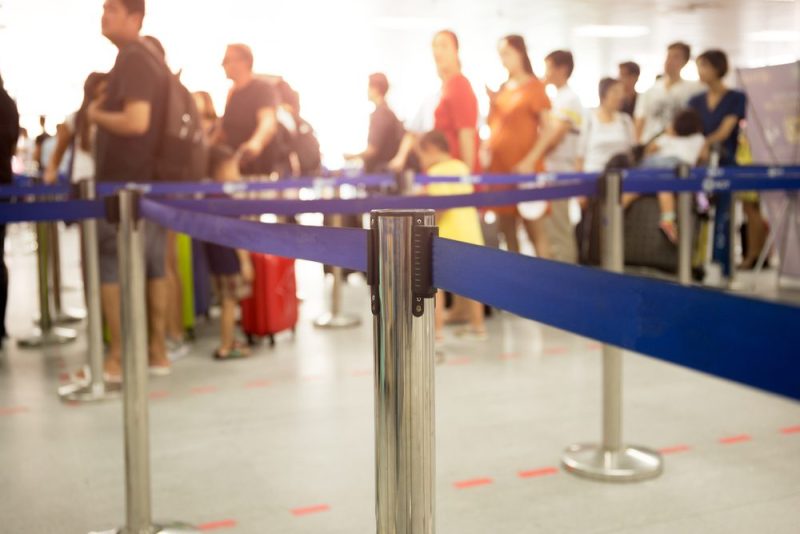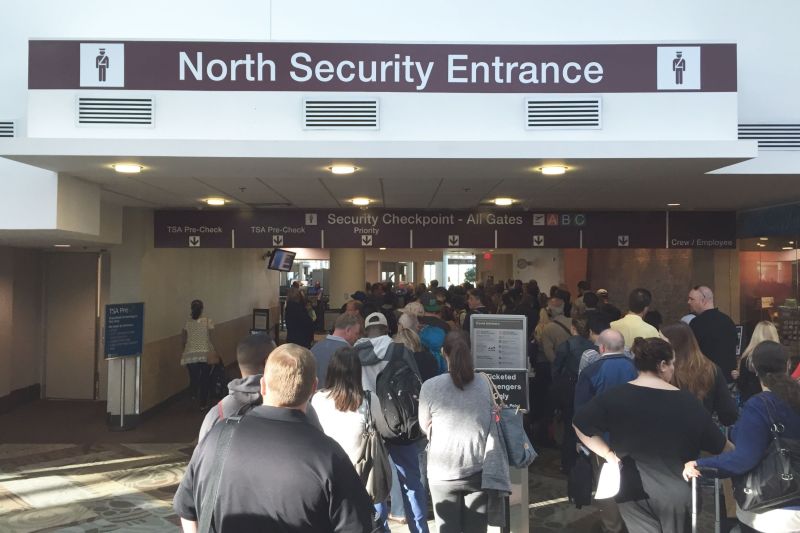
Raise your hand if you like waiting in security lines at the airport. What, no one? Well, that’s probably not surprising considering a poll of 2,000 travelers by travel comparison site Cheapflights found waiting in line was Americans’ least favorite part of airport security. That came in ahead of other unpleasantries such as taking off your shoes and coat and being patted down by TSA personnel.
Even though 31% of those surveyed said long lines were at the top of the list of most dreaded airport security experiences, 54% of those who had flown in the last 90 days reported having been caught in a long security line recently, and 7% had even missed a flight because of it.
Ah, if only there was a way to not have to endure those endless lines. Well, good news: There is! Several programs allow enrollees to skip regular airport security lines in favor of dedicated lines that are usually much shorter. You’ll have to apply, be cleared by the government, and dish out some cash, but if you travel a lot, use major airports where queues tend to be longer, or simply can’t stand being in line for long, the effort might be worth it.
There are four main skip-the-line programs available in the U.S. Three are part of the U.S. Dept. of Homeland Security Trusted Traveler Program, and the other is run through a private company.
TSA PreCheck
If you’ve been through airport security in the last few years, you’ve no doubt noticed the signs designating TSA PreCheck lines — perhaps while you were waiting in the much longer regular security line. The program, open to U.S. citizens and lawful permanent residents, allows enrollees to use the dedicated TSA PreCheck lanes at airport security at more than 200 airports, along with bypassing the requirement to remove shoes, belts, and jackets, and removing electronics from carry-on bags. In March 2023, 89% of TSA PreCheck passengers waited less than five minutes in line, according to the TSA.
You can apply for TSA PreCheck online. Once approved, you’ll be asked to make an appointment at one of more than 500 enrollment centers to be fingerprinted, provide ID, and pay the enrollment fee. Once you receive final approval, you’ll get a Known Traveler Number. Just add it to your airline reservation and head right to the designated line once you’re at airport security. Children under 12 can also use the TSA PreCheck line when traveling with a parent or guardian without enrolling in the program, so it’s a great choice if you travel a lot with kids. The cost for new enrollment is $78 and is good for five years. After that, it’s $70 for five-year renewals.
Nexus
This U.S. Customs and Border Control program allows U.S. citizens and permanent residents, along with Canadian citizens, to use TSA PreCheck expedited security lanes at U.S. airports. Nexus enrollees can also use Global Entry kiosks when entering the U.S. via Canadian Preclearance airports. If you’re enrolled in Nexus, you can also use designated expedited lanes at vehicle and pedestrian crossings in the U.S. and Canada. Canadian permanent residents and Mexican nationals can apply for Nexus for use at these crossings, but they aren’t permitted to use Nexus for TSA PreCheck at airports.
The enrollment process is similar to TSA PreCheck: You apply online, and if initially approved, you’ll make an appointment at a Nexus enrollment center for an in-person interview and fingerprinting. Once you receive final approval, you’ll get a Known Traveler Number that you can add to airline reservations. While children under 12 can use TSA PreCheck at airports when traveling with a Nexus-enrolled parent or guardian, they cannot use expedited lanes at land borders unless they have their own Nexus cards. Enrollment and renewal is $50 every five years, making Nexus an affordable alternative to TSA PreCheck and especially attractive if you cross the U.S–Canada border regularly. The drawback? Application processing time is currently 12 to 14 months.

Global Entry
Also a U.S. Customs and Border Control program, Global Entry allows expedited entry into the U.S. from international destinations for U.S. citizens, lawful permanent residents, and certain foreign nationals via automatic kiosks at select airports. All you need to do is present a passport or U.S. permanent resident card, scan your fingerprints, and complete a customs declaration. Global Entry can also be used at TSA PreCheck in airports and in Nexus lanes when crossing into the U.S. by land.
You apply online and then can complete an interview at either an enrollment center or upon arrival into the U.S. At $100 for five years, Global Entry is pricier than the other options. However, application processing time is currently only four to six months, making it a quicker alternative to waiting for Nexus’ longer processing times, and the best choice if you travel internationally.
CLEAR
Unlike the other three programs, CLEAR is not run by the U.S. government but by a privately owned company certified by the Department of Homeland Security. It allows for a quicker airport identification process at security. Instead of verifying identity by handing documents to security personnel, enrollees verify their identity at kiosks using eye or fingerprint biometrics. However, you’ll still need to go through the regular security line after that and remove your shoes, belt, jacket, and electronics from your carry-ons.
At $189 annually, CLEAR is not cheap, and identity-verifying kiosks are currently only available at 50 U.S. airports. You can apply and complete your biometric scanning at any airport that uses CLEAR or apply online, then complete your scanning at the airport. Although there are other perks, such as allowing you to check into hotels or with car rental companies that participate in the service, CLEAR is definitely the most limited and costly of all the skip-the-line programs.
No matter your needs or budget, there’s likely an expedited airport security program that will allow you to make long security lineups a thing of the past— not to mention knocking down your stress level a notch or two the next time you travel.
Editors' Recommendations
- Hate the airport security line? Make a reservation instead
- One-bag travel: 7 must-know tips to pack everything you need in a carry on
- You’re planning trips all wrong — the best hack for the cheapest flights
- Travelers beware: These are the worst U.S. airports that lose the most baggage
- Travel tips: How to maintain your skincare routine when you’re on the go






